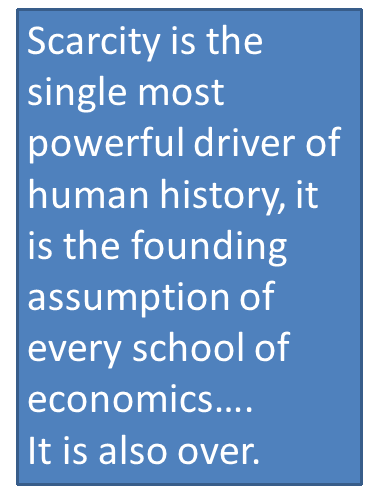The End Of The Revolution, The Beginning Of A Better Way
As I write this, I am sitting in Boston’s Logan airport surrounded by healthy- but somber-looking people clad in the yellow and blue of the official jersey of the Boston Marathon. Some are wearing their medals, some are walking with a bit of a limp. All of them are on the phone with their loved ones, telling their stories of survival. I was not one of them, I wasn’t even down in the city – my favorite place to watch the historic marathon is at the 25 kilometer mark, miles away from the explosions. But I feel for them, I feel with them, and for a brief moment, we are all brothers and sisters. With each phone call, text, email, or tweet from friends and associates from around the world – especially those from Madrid and London who feel this solidarity especially deeply – I am reminded that we are better than this, we will be better than this.
How will we be better than this? In the days and months to come we will do what the best of us always do, we will support each other and work to build a better society than the one that permitted this. But what about the long run? Given my role – I am not a first responder, I was not on the front lines, the best I could do was offer my house to marathon-running friends as a place to regroup, refuel, and just be surrounded by good feelings for a while before beginning a long drive home – I am best able to help in the long run rather than the short run.
 How? I declare an end to the revolution. Any and every revolution you ever imagined. Revolutions from the American to the Bolshevik to the Arab Spring are all predicated on the assumption of scarcity. We are all born into a world where there are few resources to go around and you either get some or you don’t, you either have the means to get more of them or you don’t. Sometimes that distribution is manipulated by evil people and a violent revolution is required to overthrow them. Sometimes that distribution of resources is bound up by tradition; history; greed; or the gentle, numbing effect of bureaucratic inefficiency, requiring political revolution to shake up, toss out, or otherwise reform the structural barriers to better distribution.
How? I declare an end to the revolution. Any and every revolution you ever imagined. Revolutions from the American to the Bolshevik to the Arab Spring are all predicated on the assumption of scarcity. We are all born into a world where there are few resources to go around and you either get some or you don’t, you either have the means to get more of them or you don’t. Sometimes that distribution is manipulated by evil people and a violent revolution is required to overthrow them. Sometimes that distribution of resources is bound up by tradition; history; greed; or the gentle, numbing effect of bureaucratic inefficiency, requiring political revolution to shake up, toss out, or otherwise reform the structural barriers to better distribution.
Scarcity is the single most powerful driver of human history, it is the founding assumption of every school of economics, it is the political reality that every system of government has had to comprehend in its own way.
It is also over.
Not yet, not immediately, I grant you that. But in the long run, scarcity is going to be vanquished, and with it, the need to feud and fight over who has what resources. This will come because of technology which continues its exponential growth forward while simultaneously falling in cost. The time is coming, sooner than you think, when revolution will be unnecessary because if you really want something, you won’t need to be mad that somebody else has it or that they’re hoarding it, you will just have to work to obtain it. The time is coming when, rather than feel threatened that other people want the same thing you have, you will encourage and even help them, because the zero-sum game of scarcity-based economics will no longer apply.
I see it happening already. In the interviews I do with digital disruptors – people that exploit technology to provide more value to the rest of us, at lower cost and with less time than before – I see them already thinking this way. I’ve interviewed C-level disruptors who want to “win” in a world where winning means getting there first for the thrill of it and so you can quickly do it again, not getting there first so you can stake your claim and hoard resources. As Jeff Hammerbacher, Chief Scientist at Cloudera told me, “I’d much rather create fertile soil for other innovators to plant their seeds in than just water my own tree.”
This is not how you and I think today, but it is already the way the rising generation thinks. They are growing up in a world where any number of resources are made available for free, from news content to network connectivity to subsidized devices to free marketplaces for ideas and goods. As I’ve written elsewhere, the knowledge, tools, and capital necessary to make this happen are expanding around the world. The digital platforms that provide access to those tools from Indiegogo and Kickstarter to Android and Ubuntu are getting better, cheaper, and even more ubiquitous. These disruptive services are not just affecting the developed world, either. Even places like Swahili are being disrupted by things like the M-Shwari mobile banking tool, an SMS-based way to accumulate and otherwise access capital.
While you and I are still in charge of business and government, we will probably make a mess of the transition. We’ll likely overregulate out of fear of the future, we’ll continue to be suspicious of outsiders, and we’ll struggle to adjust to the idea that the Law of More is going to benefit us – all of us. But when the day comes that today’s toddlers are eventually in charge, don’t be surprised when they make this happen with a minimum of fuss. For example, they will be the generation that creates and eagerly signs up for insurance plans that make (healthy) food available to the insured for free in exchange for access to their real-time biometric data – which will in turn be used to constantly monitor them to maintain their optimal health. I don’t have space here to explain all the ways this is not only doable but obvious in the future, but just imagine taking half of all health care spending out of the system by using such digital monitoring to prevent illness and you have some sense of where the money will come from to pay for the food that keeps them healthy.
The end of the revolution is coming. Will this stop tragedies like the Boston Marathon bombing? No, there will always be mental health issues (though probably fewer of them) and there will always be demagogues eager to inflict pain needlessly (though they will attract fewer adherents). But once we remove the self-righteous indignation so many perpetrators of these public acts of harm feel because they believe their group, their sect, their people get the short end of the scarcity stick, the revolution will end not because we squashed it, but because we no longer need it. We’ll be too busy living and exporing a better way.
James McQuivey, Ph.D., is a vice president and principal analyst at Forrester Research and the author of Digital Disruption. To learn more, visit forrester.com/disruption. His opinions expressed here are his own.
